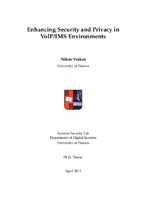Enhancing security and privacy in VoIP/IMS environments

Master Thesis
Author
Βράκας, Νίκος
Date
2013-04View/
Keywords
Voice over IP (VoIP) ; Υποσυστήματα πολυμέσων ; Multimedia Subsystem ; Session Initiation ProtocolAbstract
During the last decade, the development of technology has made Voice Over Internet Protocol
(VoIP) and other multimedia services feasible even for mobile devices. Internet users have
been gradually moving away from convectional computers since they can access such services
from everywhere, through their mobile phones. The convergence of all these heterogeneous
networks is achieved through the deployment of the IP Multimedia Subsystem (IMS). This
platform is the main signaling component in next generation networks and can bring together
all different types of networks under a common, all-IP, architecture.
As the main signaling component, the IMS is responsible for the session establishment and
management of the provided multimedia services, such as internet telephony, video and call
conferences and many more, by utilizing the session initiation protocol (SIP).
The variety of different networks and protocols, that take part in this architecture, introduce
threats, vulnerabilities and new possibilities for attacks. The technical specifications of IMS
cannot sufficiently prevent many security incidents while SIP has been proven vulnerable to
many malicious acts.
This thesis is concerned with security and privacy issues in SIP based communication services
such as the ones provided by VoIP/IMS infrastructures. All the vulnerabilities that can
be exploited and violate confidentiality, integrity, availability and privacy requirements are
presented and evaluated considering many different factors such as the time frame of the
attack, the access level of the attacker and the security mechanisms employed. Since signaling
messages’ integrity can be protected with various methods, this research has been focused on
preserving architecture’s availability, messages’ authenticity and users’ privacy.
The development of a flooding attack detection mechanism has been the first objective of this
research since such attacks pose serious threats to these environments. A metric, that is derived
by modeling the session establishment procedure, has been proposed for detecting incomplete
SIP connections. By applying simple mathematical computations, single and distributed source
flooding attacks can be detected.
Afterwards, a more advanced framework that provides prevention of both SIP signaling and
flooding attacks has been introduced. The content of packets that encapsulate SIP signaling
is analyzed and the information gathered are bound with SIP authentication. The generated
tuples are stored into tables with the support of the Bloom filters. Messages’ manipulation can
be detected by analysing the gathered data while a statistical model has been developed in
order to detect deviations from devices’ normal traffic behaviour.
Concerning privacy requirements, a mechanism that protects users’s anonymity has been
introduced. The unprotected users’ identity is concealed by utilizing commutative functions. A
new one-time identity is generated for every new session providing also unlinkability services.
All the developed mechanisms have been implemented and evaluated through numerous
different scenarios. The experimental results prove the proposed mechanisms’ efficiency while
they demonstrate that only negligible overheads are introduced.


